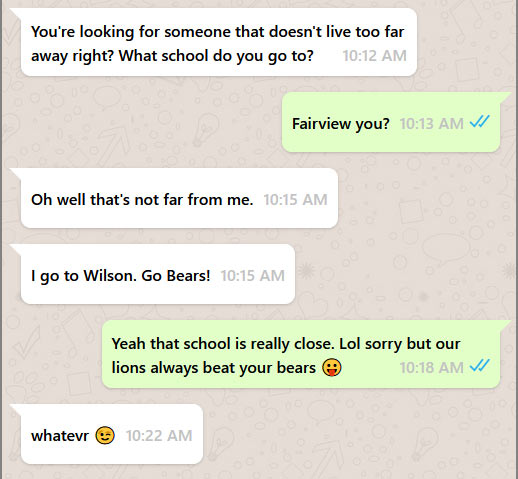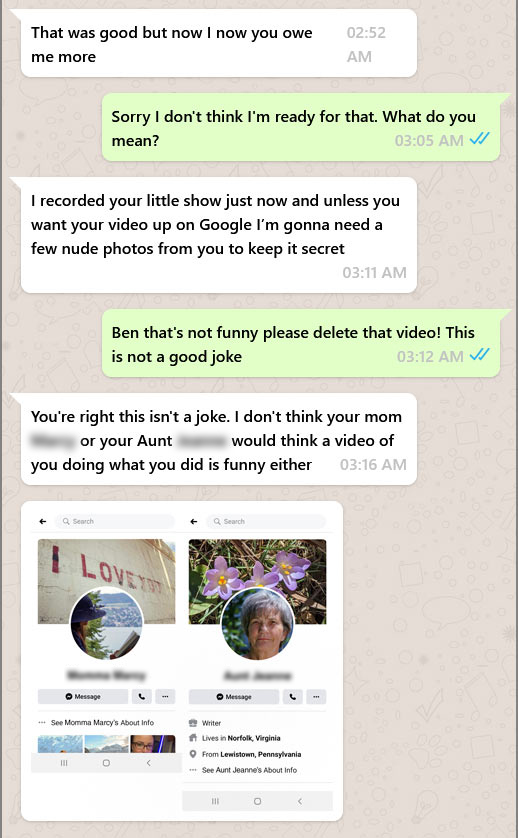Sexting and Sextortion
Sexting and Sextortion

What is sexting?
Sexting is the sharing and receiving of sexually explicit messages and nude or partially nude images via cellphone. It can also include the use of a computer or any digital device. Sexting while still a minor is illegal. The reason it’s illegal is that these images may be intercepted by, or distributed to, someone other than who it was originally sent to, compromising the privacy and safety of the original sender.
What is Sextortion?
Sextortion is a new online exploitation crime directed towards children in which non-physical forms of coercion are used, such as blackmail, to acquire sexual content from the child, engage in sex with the child, or obtain money from the child. Sextortion is a global threat. What that means is, if you send nudes or compromising images of yourself via the Internet you can become a victim of sextortion.
For more information: Sextortion
Read this blog post to see how easy it can be to fall into sexting/sextortion even with someone you may already know.*
12.11.2019
{An Anonymous Mistake...}

I should have told someone sooner, but by the time I had realized what I was involved in, I assumed it was too late. Still, I could have saved myself and my family so much embarrassment if I hadn't been so afraid to stop that man from what he was doing to me.
It started when I went on a dating app. I had just turned 16 and a few of my friends had started dating some of the boys in school, but I wasn't really into anyone in any of my classes. I wasn't really good at flirting anyway, so it was probably more likely that I just wasn't able to muster up the courage to talk to the guys I was into. I figured, if I could use the app to find someone that lived near me, I could at least work on my talking to boys skills. I also thought that if I found someone on the app, I could impress my friends with my older handsome boyfriend.
A few guys messaged me and I had some dull conversations and ignored a few creepers, but then I actually found a guy that seemed worth talking to. After some conversation, he asked what school I went to. I told him and as it turned out, he happened to be in the school just on the other side of town.

When he asked to move the conversation over to WhatsApp, that made sense to me, he was great to talk to and I was interested in keeping things going with him. I thought I was being safe by taking it slow and he'd mention things here and there that seemed a little off, but nothing that sent up any red flags in my mind. When I got a friend request from Facebook that looked like it was from him, it didn't feel weird to accept it. It was nice being in a relationship like my friends and maybe we could make it Facebook official one day and they'd get to see I had my own guy.
I thought it had been my idea and looking back I realize that it was Ben convincing me it was a good idea, but we agreed to keep our relationship on the dl. He had some story about recently getting his heart broken by a girl at his school and he didn't want people to see him fail again, so he was looking for someone he could kind of wait for people to know about. I had agreed that we should keep it low key because I also didn't want my friends to find out I couldn't keep a boyfriend.
Things had been going really well, and he would ask me for some pictures every now again because he was just crazy about how beautiful I was. So, I would send him some flirty images, but nothing too revealing, because I didn't want to risk getting caught sending those kinds of pictures to anyone. He asked a few times but wasn't pushy when I said I wasn't comfortable sending anything with nudity. That's about when things took a really bad turn too.
Our conversations got a little more focused on some more intimate topics, which I just chalked up to him being a horny guy and liking me as much as I was hoping he would. He got that I didn't want to send any naked photos, but he had an idea where we could try a video chat and get some glimpses of each other, maybe even try a little cyber-sex if I was up for it.

I had definitely never done anything like cyber-sex before, but he was very reassuring that we would take it slow and only do what I would be comfortable with. He was having issues with his camera being too dark but wanted me to try a few poses while I was naked. It didn't feel right. I wasn't very comfortable with it at all and I ended it very quickly.
Ben changed instantly after that. It felt like I had just enough time to get dressed when he started messaging me that I had given him all that he needed.

I think I went into a state of shock. He knew who my mom and aunt were, even though I hadn't shared really anything about them to him. He started demanding things and I did what he said because I was mortified that he might share that video of me. I ended up sending him a few degrading pictures that night, hoping that would be the end of it. It didn't end there though, over the course of the next few days, I'd get random text from him asking for a few more pictures, and even a few more videos. I was afraid to go online for a while, thinking that any time I opened Google, I'd see a picture of me show up. As far as I knew, as long as I did what he said, he was keeping his promise to not share anything.
Ben surprised me again when he asked for money instead of more pictures, but this turned out to be what actually saved me from this nightmare. I didn't have a job, but my parents did give me some money in a joint bank account. Ben started to demand different increments of money from me semi-regularly. I would immediately comply each time because he had a lot of blackmail to use against me at this point. The day I tried to move $300 from my account to Ben's Venmo, my mom immediately noticed and asked me about it. I was mortified but I couldn't hide what was happening anymore. She was surprisingly supportive and had me sit down with a police officer to share my story. The fact that I unwittingly saved every conversation I had with Ben helped the police to track him down.
He wasn't 16-year-old Ben from across town, but 32-year old Jason Finley, and he had been collecting images from 12 other girls my age all across the country. At first, I was embarrassed when the news got out that I was involved with this guy, but it was also freeing to no longer have to live with the fear of this guy exposing me. If you want a good take away from any of this, I guess I would say, if you feel like something like this is happening to you, the sooner you go to the cops, the better. It may be embarrassing at first, but they are there to help you out of a situation that doesn't get any easier the longer it goes.
*This is a fictional blog post and any names used in it are not real people.
To find out more about what happened to teens when they sexted, and how sexting turned into sextortion, play this example of one of the first victims of sexting as she talks with the FBI about what happened to her.
Mollie Halpern: The FBI and its partners at the National Center for Missing & Exploited Children, or NCMEC, are receiving a growing number of reports of sextortion. It’s also believed that the crime often times goes unreported.
Sextortion is a criminal act that happens when an offender uses coercion to obtain photographs and/or videos that are sexual in nature, as well as sexual favors and money. Sextortion is generally perpetrated online. Victims can include children and teens.
I’m Mollie Halpern of the Bureau, and in this edition of Inside the FBI, find out how you can assist the FBI identify victims in one of the largest sextortion cases prosecuted in the United States. Plus, hear what one of the victims in that investigation is saying. And learn what you can do to protect yourself from the crime.
The FBI has open sextortion investigations across the country involving both subjects and victims around the world. FBI Deputy Assistant Director of the Criminal Investigation Division Chris Warrener says investigations show…
Chris Warrener: Often times what we’re going to find that it’s not just one victim, it’s multiple victims—sometimes it’s hundreds of victims—and so our investigation is going to be pretty wide-ranging.
Halpern: One such wide-ranging and rigorous investigation is that of Lucas Michael Chansler, formerly of St. Johns, Florida. Between the years of 2007 and 2010, Chansler victimized about 350 girls from 26 states, three Canadian provinces, and the United Kingdom.
Posing as a 15-year-old boy, he used social networking websites such as Myspace, AIM, and Stickam to befriend girls between the ages of 13 and 18. Once they agreed to video chat with him on Stickam, he coerced them to send sexually explicit photos of themselves. Unbeknownst to the victims, he recorded the sessions. Case Agent Larry Meyer…
Larry Meyer: He had 26 different poses for 41 different pictures that he wanted from each of his victims. And they became more sexually graphic as time went on.
Halpern: Chansler used 135 different online IDs to conceal his identify and location. Forensic analysis of his computer revealed that he had about 80,000 images and videos of child pornography. Chansler released 49 of those images, and pedophiles continue to trade them on the Internet.
In November of 2014, Chansler was sentenced to 105 years in federal prison. Chansler is locked away, but investigators continue to work the case. Special Agent Meyer says 241 child victims still need identified.
Meyer: Our goal is to identify these remaining victims so they can be advised that this chapter in their life is over and he’ll never be back to antagonize them again. Just the psychological effect on so many of these victims, it’s just indescribable and very, very sad.
Halpern: As federal crime victims, the girls are due rights and services.
Meyer: It’s imperative that they understand that they are victims, and it’s imperative that they talk to a parent, a teacher, a counselor.
Halpern: Talking is exactly what Ashley Reynolds is doing. A victim of the Chansler case when she was just 14, the now 20-year-old is sharing her story of strength.
Ashley Reynolds: I don’t want anyone else to have to go through what I went through at that period in my life.
Halpern: Ashley’s parents first reported the crime to NCMEC, which worked with the FBI to identify Chansler. Ashley even gave her witness statement at Chansler’s sentencing hearing. She says speaking out about her experience makes her feel empowered.
Reynolds: I’m stronger than I ever could have been had this not, one, happened, and two, me not come forward. I feel like I’m the dominant one; the ball is in my court, basically.
Halpern: Ashley hopes other victims in the Chansler case and all sextortion victims also come forward.
Reynolds: I’m not even ashamed. I don’t feel ashamed of what happened because I know I’m a victim, and other people need to know that they’re a victim as well.
Halpern: Reporting sextortion takes courage, but by doing so, investigators say victims not only help themselves, they can prevent others from being victimized. Deputy Assistant Director Warrener…
Warrener: The key, really, to uncovering it is good communication between parents and children. Parents should have conversations with children about social networking and about the dangers that there are predators out there who will victimize them and that it can have a huge impact on their life.
Halpern: To learn more about sextortion and the Chansler case, visit www.fbi.gov. There you will find Chansler’s IDs and chat logs.
Be sure to download the infographic and keep it with you so you can easily access the information, should you ever need it!

At any time during this training, call the National Center for Missing & Exploited Children Hotline at 1-800-THE-LOST (1-800-843-5678) to speak to someone about anything in this training that concerns you.

To report an incident online, fill out a report here: CyberTipline
